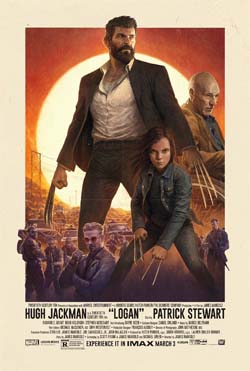
You've probably already heard this, but Logan is not a typical comic book movie. In fact, this movie feels less like a comic book movie, and more like a western combined with Terminator 2: Judgement Day and The Last of Us. This last analogy is particularly apt, considering that Logan deals with the extinction of mutants from the X-Men film universe.
The X-Men comics and movies have always been known for being topical, with their themes of racism, bigotry, and so forth, and Logan manages to to also be surprisingly topical regarding its storyline of a child fleeing [what amounts to] a violent drug cartel in Mexico, being unwelcome in the United States, and having to flee even further to Canada.
And this movie is laden with so much more possible metaphor. Logan's rejection of the comics' fallacious telling of events may symbolize our own need to let go of our childhood nostalgia regarding these fictional universes and characters and accept new and different interpretations. The final scene, with the child clutching the action figure, just so perfectly captures this bittersweet sentiment. And thank goodness that there isn't an end-credits scene, because I would have been pissed if anything had come up to ruin that perfect final shot. Or maybe it symbolizes the gradual and steady loss of our own real-world heroes. The last astronaut to walk on the moon died this year. We've lost civil rights leaders, WWII veterans are becoming increasingly rare, our 20th century pop culture icons are slowly kicking the bucket. What kinds of heroes will replace them? There's a lot to unpack here.
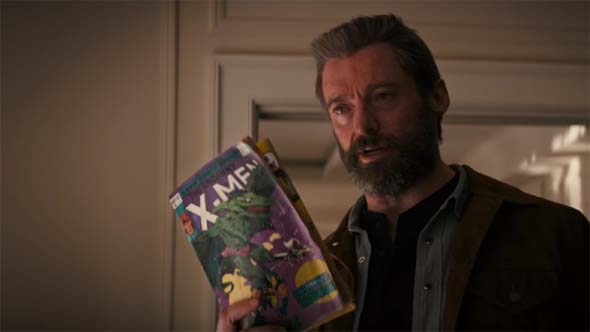
The X-Men are revered, mythical figures within the film's universe.
And by avoiding any strong, direct connections to other X-Men movies, Logan not only allows non X-Men fans to get into the movie without all the extra baggage, but it also kind of implies that maybe the previous movies aren't to be taken seriously either... [More]
dd2f0466-aa07-4b25-9194-8d7bc9888444|5|4.2
Tags:Logan, Wolverine, X-Men, Charles Xavier, Laura Kinney, X-23, Weapon X, mutant, comic book, Westchester, civil rights, racism, Hugh Jackman, Patrick Stewart, The Last of Us, Terminator 2: Judgement Day, western
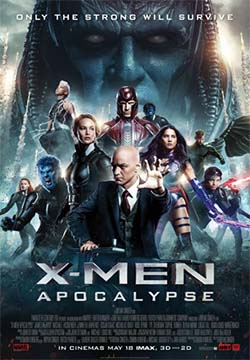
There's a bit in X-Men: Apocalypse in which Cyclops, Jean Grey, Nightcrawler, and Jubilee are walking out of a theater after seeing Return of the Jedi. Cyclops and Jubilee are arguing about whether Empire was better than Star Wars, and Jean remarks that "we can all agree that the third one is always the worst". This, of course is a jab at X-Men 3: the Last Stand, which I'm sure we can all agree is still the worst of the X-Men movies. It's also the first one that Bryan Singer didn't direct. But what might - or might not - be lost on Singer and his writers is the little bit of irony that Apocalypse is also the third movie in a series: the prequel series that started with X-Men: First Class.
X-2 and Days of Future Past remain the standout excellent films in this particular franchise. I don't think that Apocalypse ever degrades quite to the train wreck that was The Last Stand - not even close. But it does fall victim to some of the same traps that The Last Stand fell into: namely that it perhaps tried to fit too many stories into one, and doesn't tell any one of them particularly well. Much like The Last Stand, this one even starts to fall on its face when it goes into "Dark Pheonix" territory. Thankfully, they avoided turning that into a major plot thread though...
Perhaps the clumsiest storyline here was the Four Horsemen themselves. As per the comics, Apocalypse must recruit four powerful mutants, amplify their powers, and then use them as his own personal bodyguards. Other than Magneto, these characters' introductions and development all had to be rushed through. It seems a bit ironic that in these movies, it always seems to be the characters that we're most familiar with who get the most set-up and exposition; while the new characters receive little-or-no explanation or development. I never really bought into these horsemen though, or why they would be willing to help this obvious villain. I get that he tricked some of them with promises that he would "save humanity from itself", and he earned some loyalty with others by healing them and making them stronger, and that he used Magneto's grief and anger to his advantage, but the moment his plans started shifting away from "destroying corrupt systems and governments" towards outright "destroy the world", I just couldn't believe that none of the others batted an eye! Was there some kind of mind control going on as well? But he doesn't have mind control powers; that's why he wants Professor X.
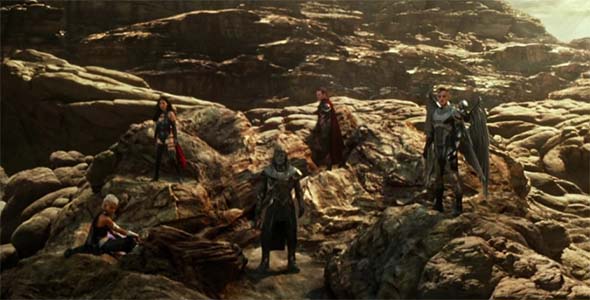
Aside from Magneto, The Four Horsemen felt undeveloped and lacking in motivation.
Maybe if the movie could have established that Apocalypse had somehow brainwashed them, then I'd be more willing to accept it... [More]
85b2663c-484f-4da7-a67a-5b36565475e8|0|.0
Tags:X-Men, X-Men: Apocalypse, Bryan Singer, 20th Century Fox, Marvel, Marvel Comics, prequel, sequel, retcon, Apocalypse, four horsemen, mutant, Magneto, Storm, Archangel, Psylocke, Charles Xavier, Cyclops, Jean Grey, Beast, Hank McCoy, Nightcrawler, Mystique, Wolverine, Weapon X, Quicksilver, Jubilee, Pheonix, James McAvoy, Michael Fassbender, Oscar Isaac, Jennifer Lawrence, Evan Peters, Sophie Turner, Olivia Munn, Lana Condor, Hugh Jackman, Star Wars, Star Trek, Who Mourns for Adonais?
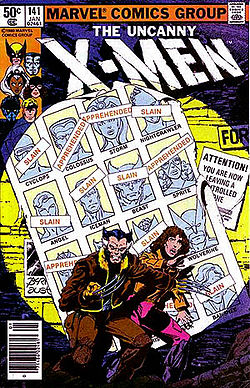
Cover of Uncanny X-Men #141:
Days of Future Past.
So, what's the deal with the "Days of Future Past" X-Men story, anyway? Sure, it's a great storyline, but other comics also have similarly great storylines. Yet, I can't think of any other comic story that is treated with as much reverence as this particular one. No other comic book story that I can think of has been directly adapted as often as this one. Not "The Night Gwen Stacy Died", not "The Death of Superman". These comic stories have been reference in numerous media, particularly Gwen Stacy's death, but rarely are they adapted. But I've yet to see an incarnation of X-Men that does not include a version of the "Days of Future Past" storyline. It's been featured in multiple animated series, video games, and novelizations.
Of course, all of the various retellings of this story take their own creative liberties, and the new movie from 20th Century Fox is no exception.
This film is designed to be a sequel to both the First Class and Last Stand movies in the X-Men franchise. I was kind of surprised that the studio took this particular approach, since there were some nagging inconsistencies and continuity issues with the two timelines. But I guess Hollywood never cares as much about continuity as the nerdy fanboys do... Fortunately, these continuity issues don't come up or interfere with this film.
In fact, I thoroughly enjoyed this film. The creative liberties were generally positive, and the combination of the two timelines actually works surprisingly well. I wasn't terribly thrilled with the depressed, brooding depiction of the younger Xavier, but I don't know enough about the character's comic book history to know whether this is anachronistic, and it definitely wasn't to the movie's detriment. [More]
373265b4-b07a-40b4-a101-2f0b77442750|1|4.0
Tags:X-Men, Days of Future Past, Bolivar Trask, sentinels, Wolverine, Kitty Pryde, Quicksilver, Bishop, Blink, Charles Xavier, Magneto, Mystique, Beast, 20th Century Fox, Bryan Singer, comic book, time travel, 1970s, Peter Dinklage, Evan Peters, Hugh Jackman, Jennifer Lawrence, James McAvoy, Michael Fassbender, Omar Sy, Bingbing Fan, Patrick Stewart, Ian McKellen
|

| 12 | | | | | | | 60 | | 11 | | | | | | | 55 | | 10 | | | | | | | 50 | | 09 | | | | | | | 45 | | 08 | | | | | | | 40 | | 07 | | | | | | | 35 | | 06 | | | | | | | 30 | | 05 | | | | | | | 25 | | 04 | | | | | | | 20 | | 03 | | | | | | | 15 | | 02 | | | | | | | 10 | | 01 | | | | | | | 05 |
|